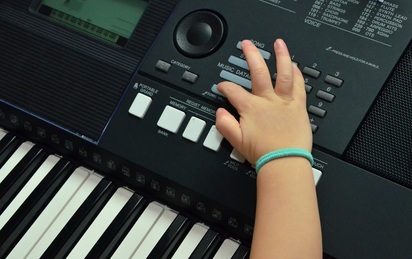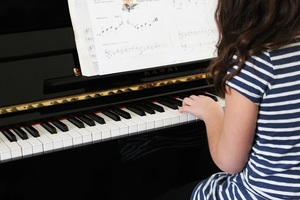|
If you begin music lessons too soon, your child may not be developmentally ready and become frustrated. However, if you start too late they may not be interested. Use these guidelines to help you develop a musical education strategy: Start at the right time. If you begin music lessons too soon, your child may not be developmentally ready and become frustrated. However, if you start too late they may not be interested. Use these guidelines to help you develop a musical education strategy: Pre-Kindergarten—With the right teacher and student, kindergarten can be a great time to start an introductory music class. Particularly effective at this age is a group lesson with other children of similar ages. Individual lessons are not as successful with younger children, in part due to their inexperience with a formal learning environment. In addition, young children typically have shorter attention spans, thus making private lessons ineffective. Kindergarten to First Grade—If you are considering piano lessons for your child, this is a great time to begin. Students of this age are typically eager to learn and have longer attention spans. With a few years of school experience behind them, they are familiar with the process of learning in a formal setting and respond well to instruction. At this time, children may also begin playing the violin. Studies have shown that violin lessons are most productive when the student is at least 6 years old. Second Grade—Second grade (or children approximately 8 years old) is a good time for children to begin playing the drums. To help minimize frustration due to a student’s inability to reach the pedals and cymbals, you should ensure that the drum kit is sized appropriately. Another good instrument to start now is the guitar. This is mostly due to the fact that by this age children’s hands have developed enough strength to apply pressure to the strings. Their hands are also big enough to hold and manage the instrument. However, students who wish to play the larger bass guitar should wait until they are 10. Third Grade—Children 9 years of age or older may be interested in learning woodwind instruments. Because woodwinds require musicians to carefully manage their air intake, it is imperative to wait until the child is a little older and has sufficient lung capacity before beginning lessons. Fourth Grade—Students interested in learning to sing may begin vocal lessons at age 10. Voice lesson require focusing on proper breathing techniques, sufficient lung capacity, and development of the child’s vocal chords. Choose a well-qualified school or instructor.Finding a school and teacher that are qualified to teach music is imperative. The ability to play an instrument does not mean that an individual will be a competent instructor. The teacher must also have a personality that works well with young students and be able to engage them in a manner that inspires them to learn. You should consider asking music schools about their hiring processes and check teachers’ references. Find out if the school will allow a trial lesson to make sure that it is a good fit for both the student and the teacher. Look for a professional teaching environment. A qualified, competent teacher is important, but a professional teaching environment is also essential to learning music. In a music school, the student will not be distracted by siblings, noise from the television, pets, or other interruptions. A focused lesson will produce far greater results than a haphazard lesson full of distractions. Moreover, being exposed to other students with varying levels of musical ability can be inspiring and motivating to a new student. Having to travel to a school for lessons also magnifies the importance of the class in the eye of the student, making it a responsibility that he or she must prepare for. Encourage effective practice.Practice is essential to learning an instrument. Helping students establish good practice habits will help them succeed in their music lessons. In addition, it can help eliminate the struggle between you and your child over daily practice sessions. Here are some ways to make practicing less painful:
Set practice times—Establishing a daily practice block will help to create a routine, making it easier for your child to remember to practice and reducing associated frustrations. Use repetition—Instead of focusing on a length of time, give your child a goal for practicing. For example: “Practice your new song four times, and then play your scale twice.” This removes the focus from the length of the practice session and redirects the child toward accomplishing his or her goals. Offer rewards—Adults and children respond well to being rewarded for their hard work; use this method to motivate your child to practice. Younger children may respond well to a simple sticker chart that lets them track their progress. Older children may earn extra television time for a week of whine-less practice. Whatever the appropriate reward may be, use it to encourage your child to develop his or her musical skills. The beginning of the year is a perfect time to start music lessons. Help your child discover a lifetime of music appreciation through the joy of playing an instrument. Comments are closed.
|
Photo used under Creative Commons from Marina K Caprara
 RSS Feed
RSS Feed
